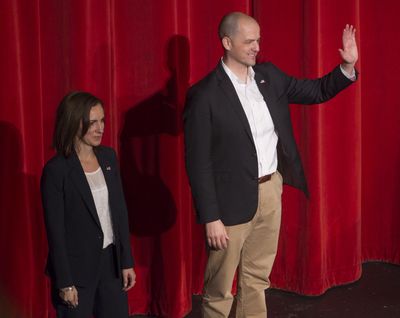Analysis: Evan McMullin attempts unprecedented election achievement

We have enough data in the bank that we can now say it: Independent candidate Evan McMullin has a very real chance of winning a state – Utah – on Election Day. Multiple polls now show him neck-and-neck with Donald Trump.
And if he does, he’ll be doing something that hasn’t been done in 92 years and has happened only once since the Civil War: Winning a single state as a protest vote.
In another way, though, what McMullin is attempting is kind of unprecedented, because no candidate has focused so intently on just one state and actually won it.
Going back through history, it’s exceedingly rare for third-party candidates to win states, and when it’s happened, it’s generally been because of racial strife. American Independent Party candidate George Wallace won five Southern states in 1968. States’ Rights Party candidate Strom Thurmond won four more in 1948. And two Southern states went for “unpledged” in 1960 rather than John F. Kennedy or Richard Nixon. All happened in the civil rights era and because of unrest.
Apart from those instances, no third-party candidate has won a state since 1924 – ever since Sen. Robert La Follette won his home state of Wisconsin.
Like La Follette, McMullin is hoping to win his home state. He’s also hoping to do so as what can’t be described as anything other than a protest vote. McMullin has focused intently on wooing fellow Utah Mormons, whose distaste for Donald Trump runs deep but who also dislike Hillary Clinton enough that McMullin has an unusual path to victory. He has done this to the exclusion of basically every other state, and he launched his campaign too late to even make the ballot in many states.
And yet, here we are this week, with polls showing him basically tied with Trump in Utah.
Back in 1924, La Follette was aiming much higher. He was actually looking like he could win as many as a dozen states by running under the newly created Progressive Party banner and accusing both major parties of being too conservative.
As Santa Clara University professor Nancy C. Unger wrote in 2000:
“Back in 1924, press reports predicted that La Follette would carry Wisconsin and possibly 12 northwestern states. Journalists forecast that La Follette’s power and influence would divide the Republicans, conceivably forcing the election of the President and Vice President into the House and Senate respectively. Instead, the majority of citizens projected to vote for La Follette did not do so…”
As with today, La Follette benefited in that race from two major-party candidates who were viewed as lackluster – Democrat John Davis and Republican Calvin Coolidge. He wound up winning only his home state, while finishing second – ahead of Davis – in 12 other states, all west of Wisconsin.
Prior to La Follette, there was Theodore Roosevelt in 1912 – a former president whose third-party candidacy could hardly be described as a protest vote. He actually finished second in the electoral college that year as the Progressive Party nominee. (Though it shared a name, this was actually a distinct and separate Progressive Party which would later fold, before La Follette picked up the mantle.)
And between the Civil War and Roosevelt, only one other third-party candidate carried a state: Populist Party nominee James Weaver, who took five states west of the Mississippi in 1892, running a campaign focused on monetary policy and combating millionaires.
Before the Civil War, American politics were much more segmented, with political parties cropping up and disappearing regularly. Accordingly, there were several third-party candidates who won states along the way.
But going back to the Civil War, what McMullin is attempting today has basically no direct precedent. We’ll see it the voters of Utah think that’s a protest vote worth casting.